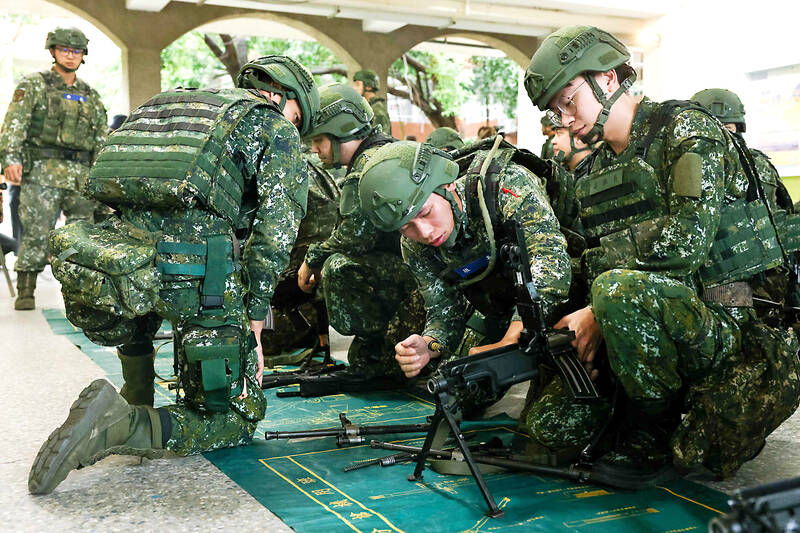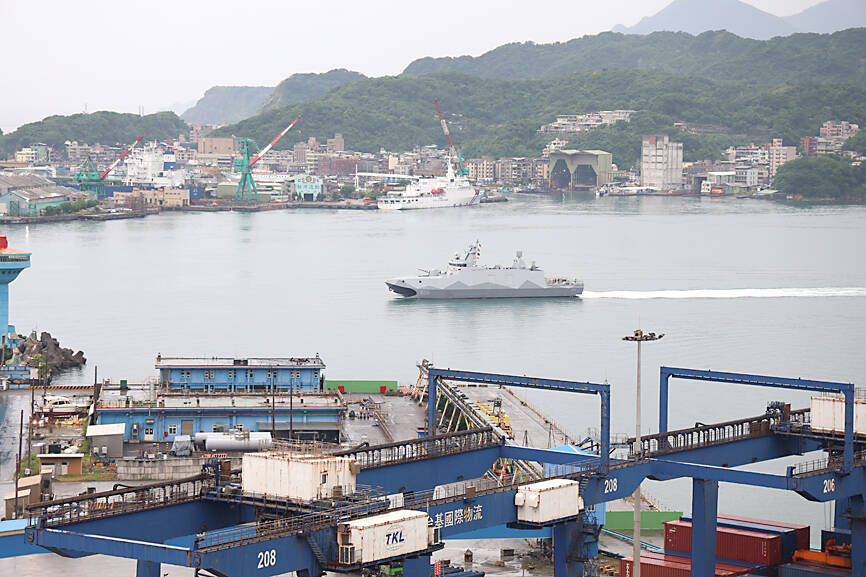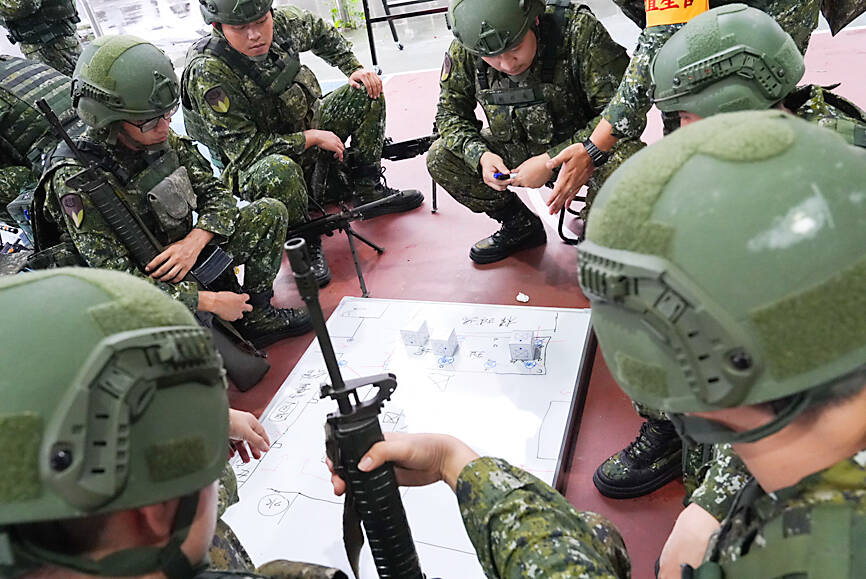Taiwan yesterday launched its largest-ever military drills intended to guard against Chinese threats to invade, including using “gray zone” tactics deployed by China that stop just short of open warfare.
This year’s 10-day live-fire Han Kuang exercises are the longest yet and follow the delivery of a range of new weaponry from tanks to uncrewed waterborne drones.
The drills began with exercises to counter the actions of China Coast Guard and maritime militia ships that have been harassing Taiwanese vessels around outlying islands close to the Chinese coast, the Ministry of National Defense said.

Cyberattacks and misinformation campaigns are seen by Taiwan as high-intensity “gray zone” actions that are likely to precede a broader Chinese assault.
Concerns are that China could launch an invasion under the guise of petty harassment, and the drills are to include fortifying ports and possible Chinese landing points in Taiwan.
The early stages of the annual Han Kuang exercises would also focus on testing how Taiwan’s military can decentralize command in the event of a crippling communications attack.

Photo: CNA
Over the 10 days, the drills would expand to assess Taiwan’s combat readiness against a full-scale attempt to seize the nation, including simulated anti-landing exercises, with regular forces from all the services backed up by the largest number of about 22,000 reservists, the ministry said.
Exercises would continue around the clock under realistic conditions taking into account all possibilities, the ministry said, in a possible attempt to counter criticisms that past exercises have veered on the performative.
“We are learning from the situation in Ukraine in recent years and realistically thinking about what Taiwan might face ... in real combat,” a senior defense official said, highlighting the need to protect command and communications systems.

Photo: CNA
“Commanders have to think what issues their troops might face and they need to pass them down to their subordinates,” the official said, speaking on condition of anonymity due to the sensitivity of the operation.
The exercises this year will for the first time feature new High Mobility Artillery Rocket Systems (HIMARS) made by Lockheed Martin along with Taiwan-developed Tien Chien II (天劍二, Sky Sword II) surface-to-air missiles.
About 300 reserve troops moved into classrooms of a junior high school in Taoyuan emptied for summer holidays, receiving instruction on mortars and rifles.
Civil defense elements would also be tested, including the creation of emergency supply stations, as well as the use of Taiwan’s expanded air-raid shelters.
The defense official said the goal was to show the international community that Taiwan is determined to defend itself.
The ministry called on the public to show patience with any disruptions to flights or traffic and not to believe false information distributed about the exercises.
Taiwanese defense officials said they believed that the Chinese military would be closely monitoring the drills.
By 6am yesterday, Taiwan had detected 31 Chinese aircraft sorties and seven naval ships, the ministry said in a statement.
About 24 of the aircraft crossed the median line of the Taiwan Strait, it said.
Asked about the drills and Taiwan’s use of US-supplied HIMARS, Chinese Ministry of Foreign Affairs spokeswoman Mao Ning (毛寧) in Beijing said that “our opposition to US-Taiwan military ties is consistent and very firm.”
Taiwan’s “attempt to seek independence through force or relying on foreign [actors] will never succeed,” Mao said.
The Chinese Ministry of National Defense on Tuesday said that the Han Kuang exercises were “nothing but a bluff.”
“No matter what weapons are used, Taiwan can’t resist the [Chinese] People’s Liberation Army’s sharp sword against independence,” Chinese defense ministry spokesman Jiang Bin (蔣斌) was quoted as saying by state broadcaster China Central Television.
Regional military attaches and analysts say the drills are being closely watched, both for China’s response and to gauge improvements in Taiwanese resilience.
China has carried out several large-scale military drills around Taiwan since President William Lai (賴清德) took office last year, as his government strongly objects to China’s sovereignty claims, saying it is up to the nation’s people to decide their future.
China specialists at risk analysis firm Eurasia Group said Beijing would “likely” carry out more military exercises at the end of this month.
Additional reporting by AFP

CHAOS: Iranians took to the streets playing celebratory music after reports of Khamenei’s death on Saturday, while mourners also gathered in Tehran yesterday Iranian Supreme Leader Ayatollah Ali Khamenei was killed in a major attack on Iran launched by Israel and the US, throwing the future of the Islamic republic into doubt and raising the risk of regional instability. Iranian state television and the state-run IRNA news agency announced the 86-year-old’s death early yesterday. US President Donald Trump said it gave Iranians their “greatest chance” to “take back” their country. The announcements came after a joint US and Israeli aerial bombardment that targeted Iranian military and governmental sites. Trump said the “heavy and pinpoint bombing” would continue through the week or as long

TRUST: The KMT said it respected the US’ timing and considerations, and hoped it would continue to honor its commitments to helping Taiwan bolster its defenses and deterrence US President Donald Trump is delaying a multibillion-dollar arms sale to Taiwan to ensure his visit to Beijing is successful, a New York Times report said. The weapons sales package has stalled in the US Department of State, the report said, citing US officials it did not identify. The White House has told agencies not to push forward ahead of Trump’s meeting with Chinese President Xi Jinping (習近平), it said. The two last month held a phone call to discuss trade and geopolitical flashpoints ahead of the summit. Xi raised the Taiwan issue and urged the US to handle arms sales to

State-run CPC Corp, Taiwan (CPC, 台灣中油) yesterday said that it had confirmed on Saturday night with its liquefied natural gas (LNG) and crude oil suppliers that shipments are proceeding as scheduled and that domestic supplies remain unaffected. The CPC yesterday announced the gasoline and diesel prices will rise by NT$0.2 and NT$0.4 per liter, respectively, starting Monday, citing Middle East tensions and blizzards in the eastern United States. CPC also iterated it has been reducing the proportion of crude oil imports from the Middle East and diversifying its supply sources in the past few years in response to geopolitical risks, expanding

Pro-democracy media tycoon Jimmy Lai’s (黎智英) fraud conviction and prison sentence were yesterday overturned by a Hong Kong court, in a surprise legal decision that comes soon after Lai was jailed for 20 years on a separate national security charge. Judges Jeremy Poon (潘兆初), Anthea Pang (彭寶琴) and Derek Pang (彭偉昌) said in the judgement that they allowed the appeal from Lai, and another defendant in the case, to proceed, as a lower court judge had “erred.” “The Court of Appeal gave them leave to appeal against their conviction, allowed their appeals, quashed the convictions and set aside the sentences,” the judges